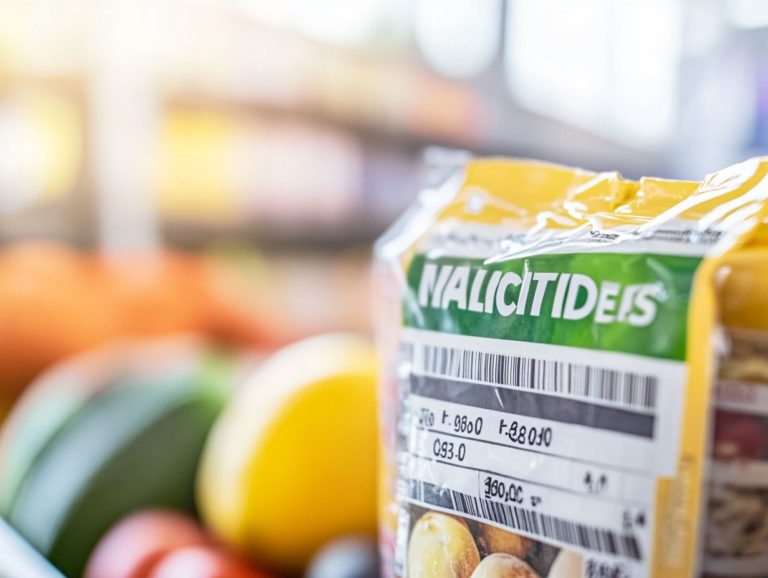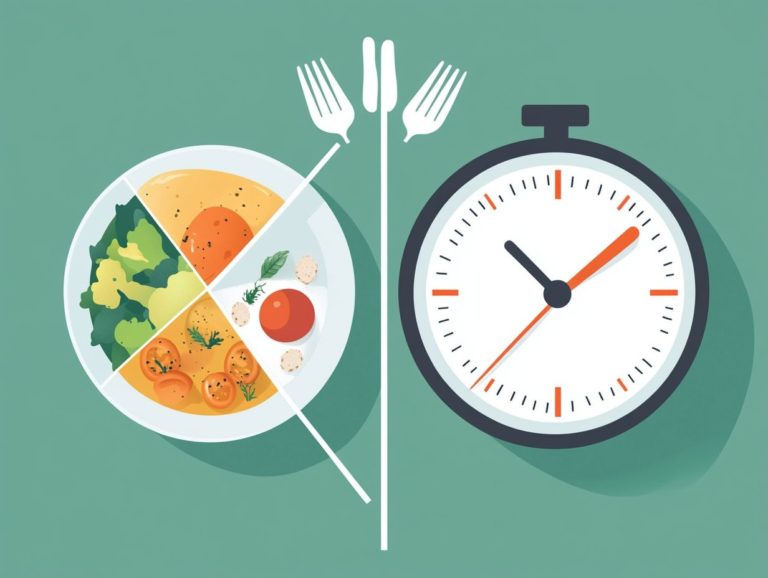5 Myths About Sugar You Should Stop Believing
Sugar often finds itself in the crosshairs of criticism, but how much of what you believe about it holds up under scrutiny?
From misconceptions surrounding diabetes to the ongoing debate between natural and artificial sweeteners, the narrative around sugar is laden with myths that can obscure your understanding of nutrition.
Let s explore five common myths about sugar, its various forms, and its impact on your health.
By the end, you’ll be ready to make informed and empowered choices about sugar in your diet!
Contents
Key Takeaways:
- Sugar is not the only cause of diabetes; genetics and lifestyle also matter.
- Natural sugars in fruits and vegetables can be healthy.
- Not all added sugars are harmful; some play important roles.
1. Sugar Is the Sole Cause of Diabetes
Many people point to sugar as the main cause of diabetes, blaming it for health issues like insulin resistance and high glucose levels. However, it s crucial to take a more nuanced view of diabetes management, recognizing how overall dietary patterns relate to sugar intake and health education.
Experts like Dr. Jennifer Haythe stress that genetics, lifestyle choices, and environmental factors significantly influence diabetes development. For instance, if you have a family history of this condition, your risk might be higher, regardless of how much sugar you consume.
Your physical activity levels, stress management, and sleep quality also play vital roles in your overall health. The National Institute of Diabetes and Digestive and Kidney Diseases dispels common myths about diabetes, including the idea that only overweight individuals are at risk.
These complexities highlight the need for a holistic approach to health, combining balanced nutrition with informed lifestyle choices.
2. All Types of Sugar Are Bad for You
While it s often believed that all sugar harms your health, it’s essential to distinguish between natural sugars in fruits and vegetables and added sugars in processed foods. Each type affects glucose absorption and overall well-being differently.
Natural sugars in apples and carrots come packed with vital nutrients and fiber that support digestion. In contrast, added sugars, often found in sauces, snacks, and cereals, can cause spikes in blood glucose levels.
This distinction is crucial when seeking dietary guidance that promotes balanced eating habits. Many people mistakenly lump all sugars together, assuming they contribute equally to weight gain and health issues, while overlooking the benefits of whole foods.
By understanding the health implications of processed foods that often contain high levels of added sugars with minimal nutrients, you can make informed dietary choices that prioritize long-term well-being.
3. Natural Sugars Are Healthier Than Added Sugars

Natural sugars found in whole fruits and vegetables are often considered healthier than added sugars. They come packed with beneficial nutrients and fiber that help counteract the negative health effects associated with high sugar levels in processed foods.
These components not only aid digestion but also enhance overall well-being by providing essential vitamins, antioxidants, and hydration. By incorporating a diverse array of fruits and vegetables into your diet, you can boost your energy levels and improve your mood.
If you’re looking to reduce added sugars commonly found in processed meals and snacks, consider alternatives like:
- Stevia
- Monk fruit
- Unsweetened applesauce
These options can sweeten your dishes effectively without negative repercussions. By prioritizing natural sugars and experimenting with suitable substitutes, you can enjoy sweet flavors while maintaining a balanced diet.
4. Artificial Sweeteners Are a Safe Alternative to Sugar
Many people turn to artificial sweeteners like aspartame, Stevia, and Truvia as sugar-free alternatives. They believe these options allow indulgence without the health risks of excessive sugar.
However, this reliance can lead to misconceptions about their safety and potential role in sugar addiction. While certain studies suggest these substitutes might help reduce calorie intake, the debate about their overall health impact is far from settled.
Critics highlight emerging research that raises concerns about potential negative effects on metabolism and gut health. These sweeteners could actually influence cravings and, somewhat ironically, spur a desire for more sugar.
Long-term studies on the use of these products remain limited. This is why many health professionals advocate for a cautious approach.
Ultimately, it’s essential to stay informed and consider moderation when evaluating your choices around artificial sweeteners.
5. Cutting Out Sugar Completely Is the Only Way to Be Healthy
The belief that eliminating sugar entirely is the sole route to health is a common misunderstanding. While cutting back on sugar can enhance diabetes management, a balanced approach that emphasizes moderation tends to be more sustainable.
By gaining insight into your dietary habits and making small adjustments, you can achieve better overall health without the feeling of deprivation often associated with strict diets.
It’s essential to recognize that the components of your diet rather than isolated elements like sugar play a crucial role in weight management. Health education acts as a powerful ally in helping you evaluate products and grasp the nutritional content of your meals.
By prioritizing informed choices, you can make the pursuit of a healthier lifestyle an attainable goal!
How Much Sugar Is Too Much?

Determining how much sugar is too much can vary based on personal dietary choices, lifestyle, and health conditions. However, it s essential to maintain awareness of your sugar consumption to mitigate the health risks associated with excessive intake.
Health experts generally recommend that added sugars should make up no more than 10% of your daily caloric intake. It s crucial to keep an eye on not just obvious sources like candy and soda, but also sneaky culprits.
Different types of sugar can impact your body in unique ways. For example, consuming fructose in excess can lead to fatty liver disease.
Be vigilant about hidden sugars in processed foods, as they can significantly contribute to your daily intake and lead to issues like obesity and insulin resistance.
What Are the Different Types of Sugar?
Understanding sugar types natural sugars, added sugars, and their roles as dietary sugars can transform your health journey! This is especially important regarding carbohydrates and their impact on your blood sugar levels.
Natural sugars, found in fruits and dairy, come packed with essential nutrients and fiber. This makes them a far healthier option compared to added sugars, which often lurk in processed foods and sugary beverages.
Added sugars can trigger a swift spike in your blood glucose levels, potentially paving the way for health issues like obesity and type 2 diabetes.
It s important to recognize that not all carbohydrates are created equal. While complex carbohydrates provide sustained energy, simple sugars may give you a quick boost but leave you feeling drained later.
By understanding these distinctions, you can navigate dietary labels confidently and make choices that enhance your overall health!
How Does Sugar Affect the Body?
Sugar affects your body in many ways. It influences metabolism, insulin production, and blood sugar levels.
This can lead to a temporary ‘sugar high’ that later crashes, impacting your energy and mood.
When you consume sugar, it breaks down into glucose. This glucose enters your bloodstream and prompts your pancreas to release insulin.
Insulin is crucial for transporting glucose into your cells. Your cells can use it for immediate energy or store it for later use.
However, eating too much sugar can raise your insulin levels, creating a cycle of cravings and overeating.
Over time, this can lead to insulin resistance, weight gain, and chronic diseases like type 2 diabetes.
Relying too much on sugar can prevent your body from absorbing nutrients effectively. This may cause deficiencies and other health issues.
What Are the Health Risks Associated with Consuming Too Much Sugar?

Eating too much sugar is linked to various health risks, including obesity, heart disease, and diabetes. It’s important to understand how a high-sugar diet impacts your health.
Research shows that regularly exceeding the recommended daily sugar intake leads to weight gain and increased inflammation.
This inflammation can result in serious conditions like metabolic syndrome. A study in the Journal of the American Medical Association found that participants who consumed more than 25% of their daily calories from added sugars faced a higher risk of dying from heart disease.
This highlights that moderating sugar consumption is essential for your well-being and longevity!
How Can One Reduce Their Sugar Intake?
Reducing sugar intake requires thoughtful dietary choices. Opt for sugar-free alternatives and cut back on processed foods that often contain high levels of added sugars.
A highly effective strategy is to read food labels carefully. This practice helps you uncover hidden sugars in products that may not seem suspicious.
Prioritizing whole foods like fruits, vegetables, and whole grains can help you create a balanced diet that satisfies your sweet tooth without added sugars.
Preparing meals at home instead of relying on takeout encourages healthier choices and gives you control over your ingredients and portion sizes.
These small changes in your routine can greatly improve your health! Start reading those labels today and take control of your health!
What Are Some Healthy Alternatives to Sugar?
Healthy alternatives to sugar, such as the natural sugars in fruits and products like Stevia, offer delightful options that satisfy your sweet cravings while minimizing health impacts. These tasty alternatives help you control your blood sugar and satisfy your cravings!
For example, using maple syrup or honey in moderation can add a rich taste to your yogurt or oatmeal. Unique options like monk fruit sweetener are also gaining popularity, celebrated for being calorie-free and very sweet.
Incorporating these substitutes into your baking or beverages can change how you think about sweetness. It makes it easier to enjoy treats without the downsides of too much sugar.
Embracing these alternatives creates a balanced diet and promotes long-term health benefits.
Frequently Asked Questions
What are the top 5 myths about sugar that people commonly believe?
The top 5 myths are: sugar causes hyperactivity, sugar is addictive, sugar causes diabetes, sugar is linked to cancer, and all types of sugar are equally bad for you.
Is it true that sugar causes hyperactivity?
No, this is a common misconception. Studies show that sugar does not cause hyperactivity in children or adults. This belief likely comes from sugary foods being linked to exciting events, like birthday parties.
Is sugar addictive?
While sugar may be enjoyable to eat, there’s no scientific evidence that it is addictive like drugs. Studies indicate that the brain responds differently to sugar compared to addictive substances.
Does sugar consumption lead to diabetes?
There’s a common belief that eating too much sugar directly causes diabetes. However, diabetes is complex, with many contributing factors, and sugar consumption alone is not enough to cause it.
Is sugar linked to cancer?
No, there is no conclusive evidence that sugar causes cancer. While high sugar intake may lead to obesity, a risk factor for some cancers, there’s no direct link between sugar and cancer.
Are all types of sugar equally bad for you?
No, not all sugars are created equal. Natural sugars in fruits and vegetables are part of a healthy diet. It’s added sugars, found in processed foods and drinks, that should be limited for a healthy lifestyle. Moderation and balance are key when it comes to sugar consumption.






